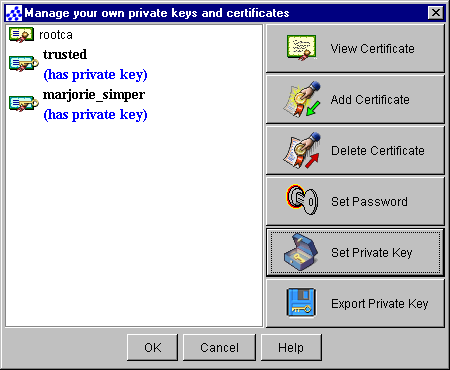Java Keystore Generate Secret Key

- Java Keystore Generate Secret Key Card
- Java Keystore Secret Key Example
- Java Keystore Generate Secret Key Location
Generate a new secret key. To generate the key, follow the same process as the one for generating a new private key. You use the Security library in each case. Import encrypted keys more securely. Android 9 (API level 28) and higher allow you to import encrypted keys securely into the Keystore using an ASN.1‑encoded key format. Java 는 KeyStore 라는 인터페이스를 통해 Encryption.exportcert Exports certificate -genkeypair Generates a key pair -genseckey Generates a secret key -gencert Generates certificate from a certificate request -importcert Imports a certificate or a certificate chain -importkeystore Imports one or all entries from another keystore. In this tutorial, we demonstrate how to extract a private key from the Java KeyStore (JKS) in your projects using OpenSSL and Keytool. Over a million developers have joined DZone. Java, PKCS12, keystore, tutorial.PKCS12 is an active file format for storing cryptography objects as a single file. It can be used to store secret key, private key and certificate.It is a standardized format published by RSA LaboratoPixelstech, this page is to provide vistors information of the most updated technology information around the world. Generate a new secret key. To generate the key, follow the same process as the one for generating a new private key. You use the Security library in each case. Import encrypted keys more securely. Android 9 (API level 28) and higher allow you to import encrypted keys securely into the Keystore using an ASN.1‑encoded key format. Oct 15, 2014 Introduction. Java Keytool is a key and certificate management tool that is used to manipulate Java Keystores, and is included with Java. A Java Keystore is a container for authorization certificates or public key certificates, and is often used by Java-based applications for encryption, authentication, and serving over HTTPS.
The Java KeyStore is a database that can contain keys. A Java KeyStore is represented by the KeyStore (java.security.KeyStore) class. A KeyStore can be written to disk and read again. The KeyStore as a whole can be protected with a password, and each key entry in the KeyStore can be protected with its own password. This makes the KeyStore class a useful mechanism to handle encryption keys securely.
A KeyStore can hold the following types of keys:
- Private keys
- Public keys + certificates
- Secret keys
Private and public keys are used in asymmetric encryption. A public key can have an associated certificate. A certificate is a document that verifies the identity of the person, organization or device claiming to own the public key. A certificate is typically digitally signed by the verifying party as proof.
Secret keys are used in symmetric encryption. In many cases symmetric keys are negotiated when a secure connection is set up. Therefore you will more often be storing public and private keys in a KeyStore than secret keys.
Creating a KeyStore
You can create a Java KeyStore instance by calling its getInstance() method. Here is an example of creating a KeyStore instance:
This example creates a KeyStore instance of Java's default type. It is also possible to create other types of KeyStore instance by passing a different parameter to the getInstance() method. For instance, here is an example that creates a PKCS12 type KeyStore:
Loading the KeyStore
Before a KeyStore instance can be used, it must be loaded. KeyStore instances are often written to disk or other kinds of storage for later use. That is why the KeyStore class assumes that you must read its data in before you can use it. However, it is possible to initialize an empty KeyStore instance with no data, as you will see later.
Loading the KeyStore data from a file or other storage is done by calling the KeyStoreload() method. The load() takes two parameters:
- An InputStream from which to load the
KeyStoredata. - A
char[](chararray) containing theKeyStorepassword.
Java Keystore Generate Secret Key Card
Here is an example of loading a Java KeyStore:
This example loads the KeyStore file located in the keystore.ks file.
If you don't want to load any data into the KeyStore, just pass null for the InputStream parameter. Here is how loading an empty KeyStore looks:
You must always load the KeyStore instance, either with data or with null. Otherwise the KeyStore is uninitialized, and all calls to its methods will throw an exception.
Getting Keys
You can get the keys of a Java KeyStore instance via its getEntry() method. A KeyStore entry is mapped to an alias which identifies the key, and is protected with a key password. Thus, to access a key you must pass the key alias and password to the getEntry() method. Here is an example of accessing a key entry in a KeyStore instance:
If you know that the key entry you want to access is a private key, you can cast the KeyStore.Entry instance to a KeyStore.PrivateKeyEntry. Here is how that looks:
After casting to a KeyStore.PrivateKeyEntry you can access the private key, certificate and certificate chain via these methods:
- getPrivateKey()
- getCertificate()
- getCertificateChain()
Setting Keys
You can also set keys into a KeyStore instance. Here is an example of setting a secret key (symmetric key) into a KeyStore instance:
Java Keystore Secret Key Example
Storing the KeyStore
Sometimes you may want to store a KeyStore to some storage (disk, database etc.) so you can load it again another time. You store a KeyStore by calling the store() method. Here is an example of storing a KeyStore